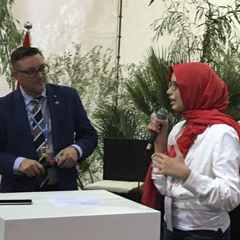[2 December 2016] -- At the United Nations Framework Convention on Climate Change (UNFCCC) COP21 in Paris last year, Cities Alliance took advantage of the global platform to formally launch its Joint Work Programme (JWP) on Resilient Cities. This November, at COP22 in Marrakesh, the JWP has emerged as a global coalition for action.
It has consolidated its partnerships and defined a programmatic approach to addressing climate resilience in developing cities in Africa, Asia and Latin America. This multi-faceted approach focuses on enhanced climate mitigation and adaption planning, innovative resilience data assessments at the settlement level, access to financing for implementation, and sharing of challenges and opportunities for cities at global policy dialogues.
The JWP was a visible presence at COP22, co-hosting and participating in numerous events. At a high-level political segment on Cities and Human Settlements organised on Cities Day (10 November), ICLEI-Local Governments for Sustainability recognised the JWP for Resilient Cities as one of several champions for resilience-related initiatives.
Cities Alliance and eight partner organisations, including the Intergovernmental Panel on Climate Change (IPCC), held a side event to launch a call for a host city for a newly announced 2018 Cities and Climate Change Science Conference. The conference will be an excellent opportunity to help shape a global research agenda on cities and climate change that will support policy and implementation at the city level to address the growing challenges of climate change.
A highlight for the Cities Alliance team was a side event on Climate Action Planning co-hosted with C40 and the World Bank. Aimed at practitioners and city planners, a group of young women and girls from a Moroccan environmental NGO, Alfetra, also attended the event. The NGO is focused on engaging youth on environmental issues, and one way they have done so is by developing a game about cleaning up the environment that people can play on their smartphones.
The spokesperson for the group, a 13-year-old Moroccan girl who speaks six languages, challenged the speakers of the session about what kind of tools have been developed that young people could use to help their cities plan more effectively for climate change. It was a strong message powerfully delivered, and yet another reminder that youth must be a part of developing resilient cities.
Cities and climate change: International agreements and finance
Taking place just weeks after the adoption of the New Urban Agenda at Habitat III, the linkages between COP22 and Habitat III were evident to organisations that were active and present in both events, such as Cities Alliance. While there is certainly more recognition of cities and local municipalities in climate change circles, there was limited discussion about the synergies of implementation across Agenda 2030, the Paris Agreement, and the New Urban Agenda.
At COP22, there were three key issues with direct relevance for cities and regional climate action that received considerable attention:
110 countries included urban content in their NDCs
As the Paris Agreement has now entered into force, the Intended Nationally Determined Contributions submitted by member countries have become Nationally Determined Contributions (NDCs) which outline the focus areas, sectors and actions that countries will undertake to keep global warming to 2 oC (or ideally 1.5 oC).
A review of NDCs undertaken by UN-Habitat showed that 110 countries included “urban content” in their NDC, especially rapidly urbanising regions of Africa and Asia. The review revealed that while there was relatively even balance between mitigation and adaptation, there was a lot of focus on urban sectors – transport, energy, waste, and buildings – as having significant mitigation potential.
Financing for implementation
Financing for implementation was a constant topic for negotiations, with developing countries asking for USD 100 billion annually for both mitigation and adaptation efforts. Multiple panels highlighted the importance of financing for women’s groups and groups working on gender equality, even though the issue was not explicitly part of the agenda.
‘Loss and Damage’
Developing countries were particularly interested in the negotiations around ‘loss and damage,’ a mechanism set up by the Warsaw COP19 to compensate countries’ economic losses due to climate impacts. Cities, especially those in coastal areas, have a clear interest is moving this mechanism forward, as these areas are where economic assets are concentrated and often vulnerable to climate shocks.
What's next for the Joint Work Programme on Resilient Cities
As the New Urban Agenda and Paris Agreements enter the implementation stage, partnership
organisations such as Cities Alliance can play a critical role in facilitating cross-fertilisation of knowledge, resources and approaches to support the process. Our Joint Work Programmes have established technical cooperation platforms that can serve as a good example of mobilisation and knowledge exchange.
Our Resilient Cities JWP comes away from both Habitat III and Quito energised and ready to focus its investments in 2017 on specific cities. Currently, the JWP is systematically defining the cities where global tools on planning, data and financing will be concentrated. The discussions and outcomes from COP22 – including the Global Climate Action Outcome document on Cities and Regions and the Marrakech Roadmap for Action, which was produced from the Climate Summit for Local and Regional Leaders – will guide the direction of the JWP for 2017. This includes greater emphasis on two priorities: aligning and supporting city action under countries’ NDC frameworks, and localising climate finance to support implementation.

The Moroccan NGO Alfetra issued a powerful reminder that youth must be a part of developing resilient cities. Photo: Cities Alliance
Our Resilient Cities JWP comes away from both Habitat III and Quito energised and ready to focus its investments in 2017 on specific cities.
Watch a video on addressing city resilience from our JWP Habitat III
Related Items
Towards the 2018 Cities and Climate Change Science Conference
Habitat III Showcases a Vibrant, Relevant Cities Alliance Partnership




